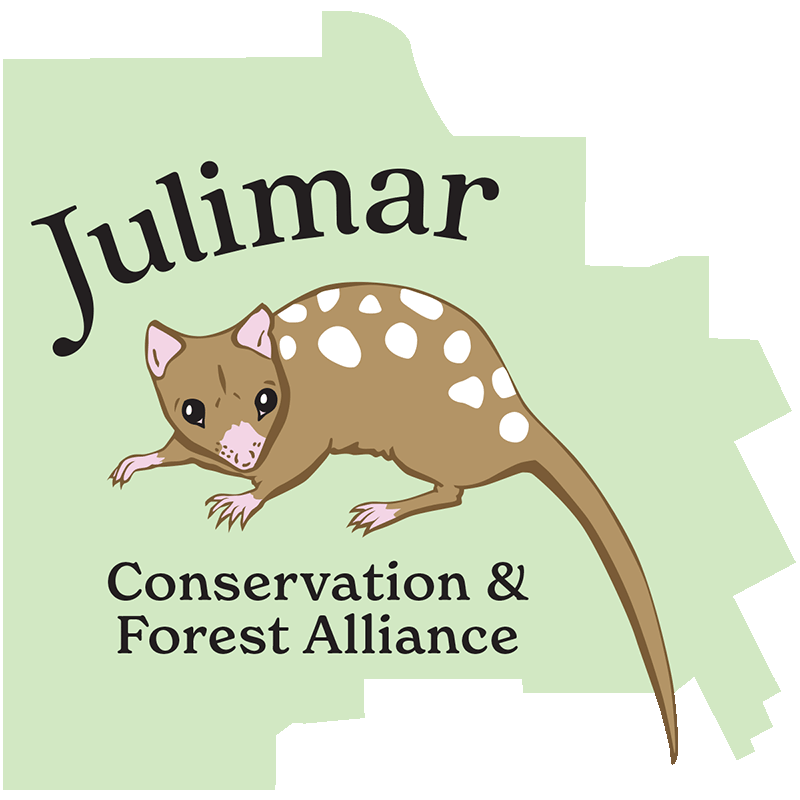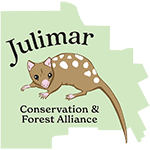Photo credit: © Phil Lewis.
Julimar State Forest’s rich and diverse vegetation offers a refuge for many species including Chuditch, Woylie, Honey Possum, and the Western Pigmy Possum, . Furthermore, it provides vital nesting and feeding habitat for Black Cockatoos.
…Of particular importance is the value of the area for a number of threatened species, including as one of only a few identified habitats for the critically endangered woylie. Julimar State Forest is also identified as one of the key habitat areas for chuditch and Carnaby’s black cockatoo, and is identified as being in largely excellent condition.
Its 28,600 hectares contain at least 20 vegetation communities including:
- Mixed woodland of Wandoo, Powderbark Wandoo an (Ed Marri ucalyptus wandoo, Eucalyptus accedens and Corymbia calophylla).
- A large area of mid open forest of Jarrah and Marri with several Banksia species (Eucalyptus marginata and Corymbia calophylla with Banksia sp).
- Tall shrubland of Pingle and Roadside Tea-tree(Banksia squarrosa ssp squarrosa and Leptospermum erubescens).
- Open heath and riparian communities.
Julimar State Forest is ecologically significant and has been recognised as a Key Biodiversity Area:
- It provides vital habitat for 140 recorded species of birds, 30 species of mammals, 60 species of reptiles and amphibians, and an estimated 350 species of invertebrates.
- It contributes to the conservation of vulnerable species such as the Black-gloved Wallaby, Woylie and Chuditch and is a key site for the Chuditch Relocation Program.
- Large numbers of endangered Carnaby’s Black Cockatoo use the many nesting hollows on an annual basis.
- Over 500 wildflower species have been found in the Forest including 27 known priority species.
- The Forest is part of the catchment of the Avon River, which becomes the Swan River which flows through Perth.
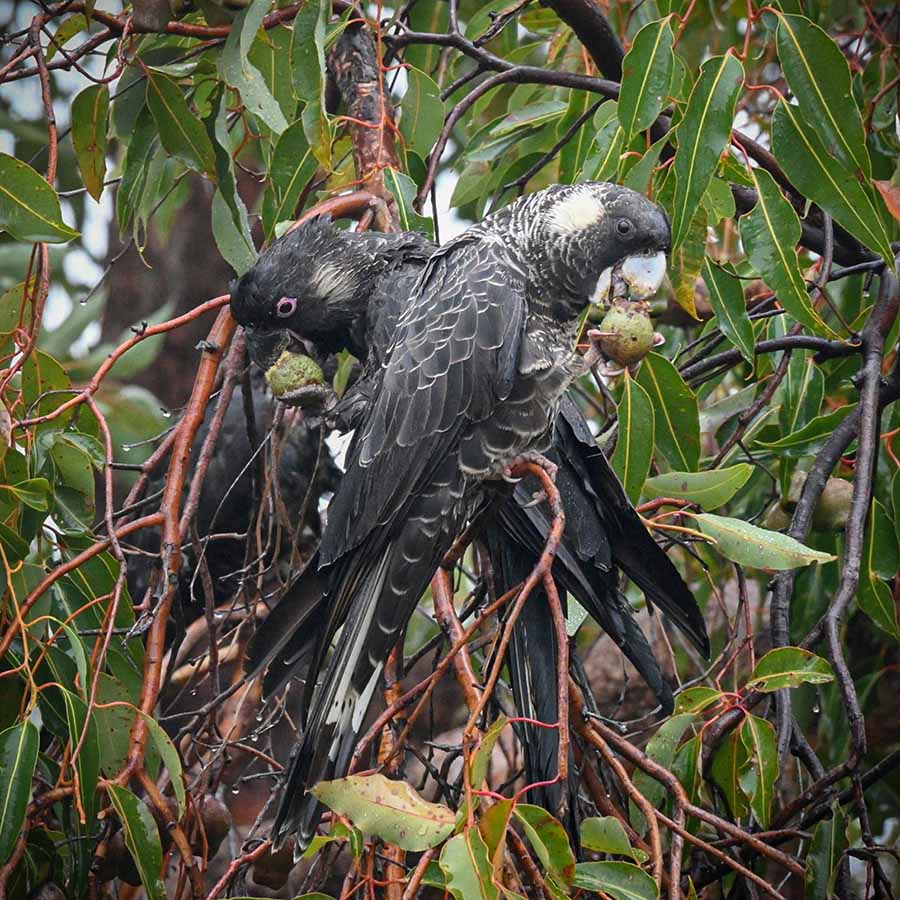
Toodyay 2015 BioBlitz Report
In 2015 a bio blitz was jointly conducted by Wheatbelt NRM and the Toodyay Naturalists’ Club. Part of this survey included Julimar State Forest.
This report summarises findings from the event, identifies various species found during the survey, and identifies environmental management issues.
Priority Species List
Source: Naturemap, DBCA, Ref 42-0622NM
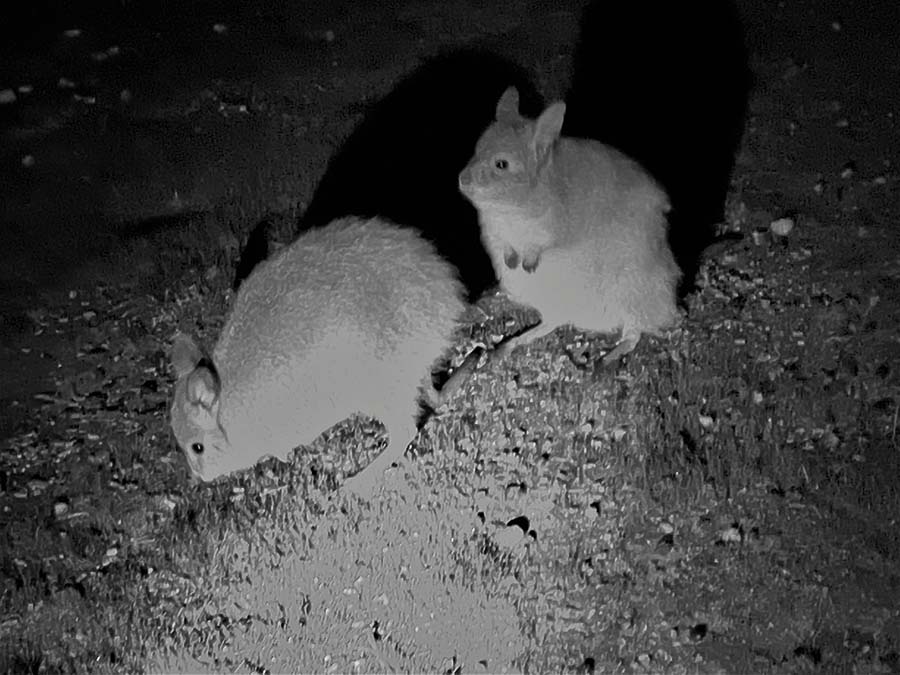
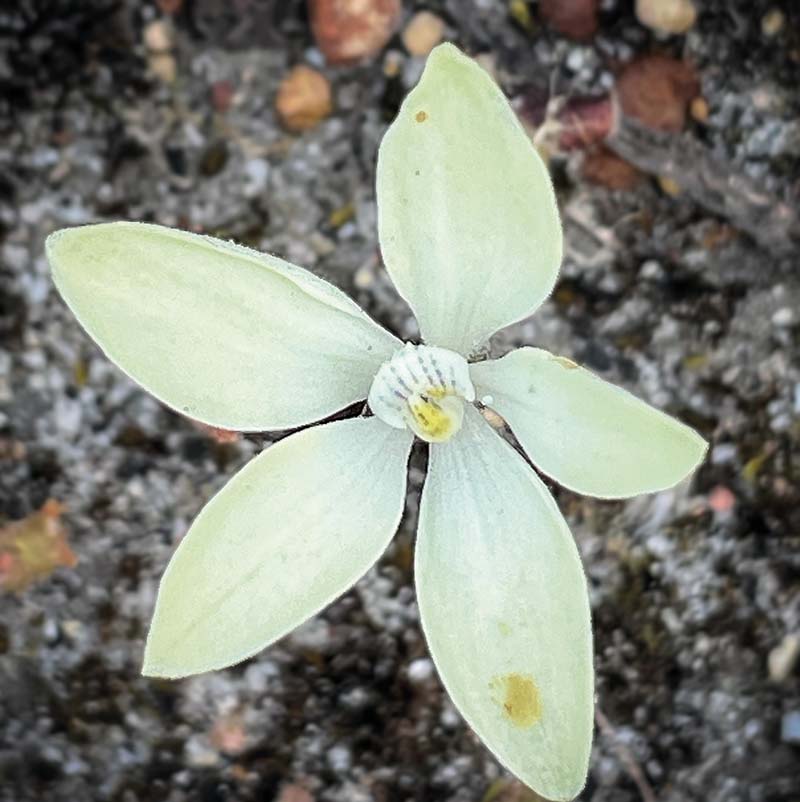
A Yellow China Orchid (Cyanicula ixioides subsp. ixioides). Photo by © Jacquie Lucas.
| Scientific Name | Common Name | Conservation status |
|---|---|---|
| Flora | ||
| Thelymitra stellata | Star Orchid | EN |
| Conostylis caricina subsp. elachys | Catspaws | P1 |
| Cyanicula ixioides subsp. candida | White china orchid | P2 |
| Johnsonia inconspicua | P3 | |
| Schoenus natans | P4 | |
| Cyanicula ixioides subsp. ixioides | Yellow China Orchid | P4 |
| Hypocalymma sylvestre | EN | |
| Grevillea bracteosa subsp. bracteosa | EN | |
| Synaphea panhesya | P1 | |
| Gastrolobium crispatum | P1 | |
| Stylidium vinosum | P1 | |
| Lechenaultia magnifica | P1 | |
| Acacia browniana var. glaucescens | P2 | |
| Drosera sewelliae | Red Woolly Sundew | P2 |
| Grevillea candolleana | P2 | |
| Verticordia citrella | P2 | |
| Millotia tenuifolia var. laevis | P2 | |
| Lasiopetalum caroliae | P3 | |
| Adenanthos cygnorum subsp. chamaephyton | P3 | |
| Tetratheca pilifera | P3 | |
| Acacia drummondii subsp. affinis | Drummond’s Wattle | P3 |
| Persoonia sulcata | P4 | |
| Oxymyrrhine coronata | P4 | |
| Synaphea grandis | P4 | |
| Hibbertia miniata | Orange Hibbertia | P4 |
| Asterolasia grandiflora | Starbush | P4 |
| Grevillea corrugata | VU |
| Scientific Name | Common Name | Conservation status |
|---|---|---|
| Animals | ||
| Calyptorhynchus latirostris | Carnaby’s Black Cockatoo | EN |
| Calyptorhynchus baudinii | Baudin’s Black Cockatoo | EN |
| Falco peregrinus | Peregrine Falcon | OS |
| Calyptorhynchus banksii subsp. naso | Forest Red-tailed Black-Cockatoo | VU |
| Aspidites ramsayi subsp. (southwest subpop.) | Woma Python | P1 |
| Ctenotus delli | Darling Range south-west ctenotus | P4 |
| Phascogale tapoatafa subsp. wambenger | Brush Tail Phascogale | CD |
| Bettongia penicillata subsp. ogilbyi | Woylie | CR |
| Isoodon fusciventer | Quenda | P4 |
| Notamacropus irma | Western Brush Wallaby | P4 |
| Notamacropus eugenii subsp. derbianus | Tammar Wallaby | P4 |
| Dasyurus geoffroii | Chuditch | VU |
| Macrotis lagotis | Greater bilby | VU |
Specially protected fauna under wildlife conservation act 1950.
Source: Government gazette 11/09/2018 pp 3232 – 3242
In Julimar State Forest
SCHEDULE 1
Being fauna that is rare or likely to become extinct, as critically endangered fauna, are declared to be fauna that is in need of special protection.
Woylie (Bettongia penicillata ogilbyi)
SCHEDULE 2
Being fauna that is rare or likely to become extinct, as endangered fauna, are declared to be fauna that is in need of special protection.
Baudin’s Cockatoo (Calyptorhynchus baudinii ) Data to be confirmed
Carnaby’s Cockatoo (Calyptorhynchus latirostris)
SCHEDULE 3
Being fauna that is rare or likely to become extinct, as vulnerable fauna, are declared to be fauna that is in need of special protection.
Chuditch (Dasyurus geoffroii)
Forest red-tailed Cockatoo (Calyptorhynchus banksia naso)
SCHEDULE 7
Are declared to be fauna that is in need of special protection, otherwise than for the reasons mentioned in paragraphs (a), (b), (c), (d), (e) and (f).
Peregrine Falcon (Falco peregrinus)
